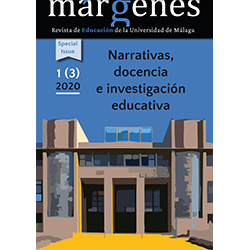Narrative research as an opportunity to express the teacher's emotions from their experience
DOI:
https://doi.org/10.24310/mgnmar.v1i3.9493Keywords:
emotions, experience, narrative research, psychopedagogy, be teachersAbstract
This paper aims to show how teachers constantly experience tensions in their work activities related to the social, political and cultural demands that lie with them; the significance of being a teacher in today’s educational scenario, highlighting its idealized figure which limits the subjectivity and, therefore, their emotional response. For this reason, narrative research is implemented as a manner of offering them a possibility for expressing, in their own voice, circumstances and experiences that permit them to critically question themselves the way how the emotions and the gender role are conceived within the education environment. To enrich the dialog, the central ideas are supported by authors that address the emotions from a holistic point of view and also question some demands related to the teacher’s figure.Downloads
Metrics
Publication Facts
Reviewer profiles N/A
Author statements
Indexed in
-
—
- Academic society
- N/A
- Publisher
- Universidad de Málaga
References
Abramowski, A. (2010). Maneras de querer: los afectos docentes en las relaciones pedagógicas. (29-50). Buenos Aires: Paidós.
Baeza, S. (2012). Psicopedagogía: nuevos desafíos hoy. Hacia las mejores prácticas del mañana. Argentina: Universidad del Salvador. Recuperado de: https://clck.ru/NjdDe
Bauman, Z., (2007). Miedo líquido. (1). Argentina: Paidós.
Camps, V. (2011). El gobierno de las emociones. Barcelona: Herder.
Carr, W. y Kemmis, S. (1988) Maestros, investigadores y curriculum. Teoría crítica de la enseñanza: la investigación-acción en la formación del profesorado. Barcelona: Ediciones Martínez Roca, S. A.
Decety, J., y Jackson, P. (2004). The functional architecture of human empathy. Behavioral and cognitive neuroscience reviews, 3(2), 71-100. doi: 10.1177/1534582304267187
Ministerio de Educación de Colombia. Decreto 1278 de 2002. Recuperado de: https://clck.ru/NjdEV
Parra, M. (2004). La construcción de la identidad profesional del docente. Revista Enfoques Educacionales. 6(1). Santiago de Chile: Universidad de Chile. Recuperado de: https://clck.ru/NjdhY
Runge, A. (2019). Paradojas y antinomias del actuar pedagógico profesional docente. En Alvarado, J.(ed) Consideraciones en educación. (pp. 18- 41). Buenos Aires: CLACSO.
Van Manen, M. (1998). El tacto en la enseñanza. Barcelona: Paidós.
Downloads
Published
How to Cite
Issue
Section
License
The editorial team of Márgenes supports an open Access policy of scientific knowledge. apostamos claramente por una política de acceso abierto del conocimiento científico (see Berlin Declaration).
Authors with work published in this journal accept the following conditions:
- This journal provides immediate free access to its content under the principle of making research freely available to the public. All contents published in Márgenes are subject to the Creative Commons Reconocimiento-SinObraDerivada 4.0 Internacional
It is the responsibility of the authors to obtain the necessary permissions of the images that are subject to copyright.
Authors whose contributions are accepted for publication in this journal will retain the non-exclusive right to use their contributions for academic, research and educational purposes, including self-archiving or deposit in open-access repositories of any kind.
The electronic edition of this magazine is edited by the Editorial of the University of Malaga (UmaEditorial), being necessary to cite the origin in any partial or total reproduction.
- Authors can enter into other additional independent contractual agreements for the non-exclusive distribution of the version of the article published in this journal (e.g. including it in an institutional repository or publishing it in a book) on the condition that they clearly indicate that the work was originally published in this journal.
- Authors are allowed and recommended to publish their work on the Internet (for example on institutional and personal websites), before and after the publication, as this could lead to constructive exchanges and a more extensive and quick circulation of published works (see The Effect of Open Access).















